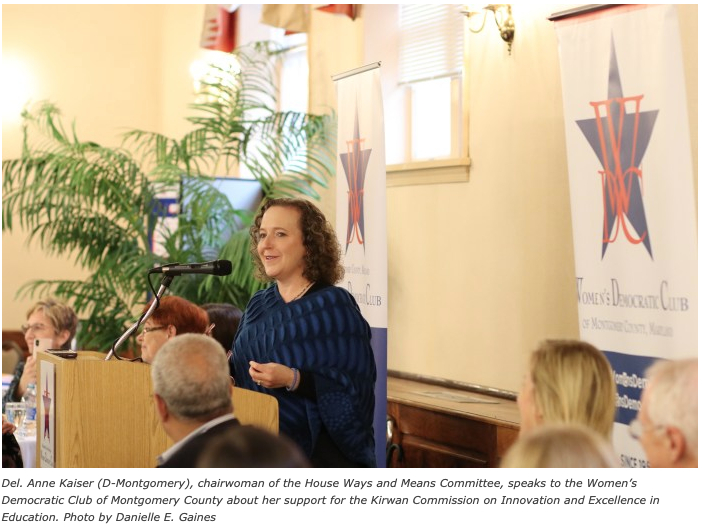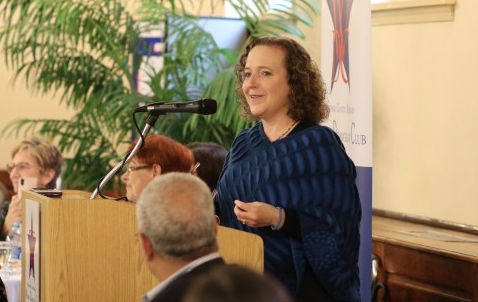 Legislators in Annapolis have a plan to fund education reforms from the Kirwan Commission that wouldn’t require any new revenue until the 2022 fiscal year, a legislative leader told the Women’s Democratic Club of Montgomery County.
Legislators in Annapolis have a plan to fund education reforms from the Kirwan Commission that wouldn’t require any new revenue until the 2022 fiscal year, a legislative leader told the Women’s Democratic Club of Montgomery County.
Del. Anne Kaiser (D-Montgomery), chairwoman of the House Ways and Means Committee, said she expects a number of tax revenue proposals to come before her committee in the 2020 legislative session, including changes pushed by progressive groups that would impose a millionaire’s tax, change the corporate tax structure and end some business tax credit programs.
“Of course, one person’s tax loophole is another person’s tax incentive. So we’ll figure that out,” Kaiser said.
Other tax proposals on the horizon include a reconsideration of the state’s sales taxes to possibly include taxes on services and internet downloads.
One measure she thinks is likely to pass this year is legalized sports betting, which she said would increase state revenues by an estimated $20 million.
“I do expect us to pass that this upcoming legislative session,” Kaiser said. But “that is not a panacea of any sorts.”
She’d also like to see legislators create a long-term commission to study and understand the economic effects of various taxes in the state, an idea from another Montgomery County delegate, Kathleen M. Dumais (D).
In the more distant future, Kaiser said she personally supports marijuana legalization and taxation.
However, Kaiser said lawmakers and advocates shouldn’t only talk about taxes as a way to fund education reforms. They should stop talking about “funding” and “taxes” and think about it as “investing” in the future, Kaiser said.
“The budget isn’t numbers. It is a reflection of our values,” she said.
Kaiser, as well as the commission’s chairman, William E. “Brit” Kirwan, had sharp words for Gov. Lawrence J. Hogan Jr. (R), who has become increasingly critical of the cost for the education reform plan and whose Change Maryland Action Fund is hoping to raise $2 million to help the governor beat back the reform effort.
“The legacy of this governor is that he’s trying to kill the best educational opportunities that we have for my daughter and the next generation. And I think that’s a shame,” Kaiser said.
In response to criticisms, Hogan’s office frequently notes that he’s included more money for education in his proposed state budgets than any other governor of the past. But Kaiser said that’s due to increasing enrollment, increasing costs, and legislatively driven formula funding increases.
“Governor Hogan boasts proudly that he’s invested more in education than any governor in the history of the universe. That sounds like to me, that he’s owning what we have in education now,” Kirwan told the club members at a luncheon. “So, I want to ask Governor Hogan: Are you happy with what you’re getting for your investment? Are you happy that fewer than 40 percent of graduates from our high schools are college- and career-ready? Are you happy that we have gross funding inequities around the state? Does that make you feel good? Are you happy that teaching is a revolving door?”
“He’s owned this. Because he’s bragging about his investment,” Kirwan said.
Hogan’s office responded Friday evening. Despite years of meetings by the Kirwan Commission, supporters and legislative leaders have not laid out a clear plan for how to fund the proposals long-term, Hogan spokesman Michael Ricci said in an email.
“…Despite all the self-congratulations, there is still no clear plan whatsoever to pay for their proposals. They simply don’t like the fact that the governor is being honest with Marylanders about the potential for staggering tax increases at both the state and local levels,” Ricci said. “And with each passing week, more local officials across the state are joining the governor in speaking out for taxpayers.”
Responding to Kirwan’s remarks, Ricci added: “Desperate things are said at desperate times, and that’s clearly what’s happening here.”
The governor’s office added that Hogan does support many of the policy recommendations of the commission and has pressed for other education reforms during his tenure, including increased accountability, expanding charter schools and a $2 billion school construction plan.
Reforms proposed by the Kirwan Commission include expanding career and early education programs, increasing salaries and other supports for state teachers, and providing additional resources in schools with high concentrations of poverty.
To fund the proposals, state education funding is expected to steadily increase over the next decade until an additional $2.77 billion in state aid would go to schools in 2030. County budgets would also increase during that time period, up to a cumulative $1.23 billion annually.
Kaiser was asked about the prospect of the commission’s recommendations passing.
She responded by pointing to the number of influential legislators on the panel who support its findings.
When the commission first started, Kaiser was a subcommittee chairwoman; she’s since become head of the committee. Kaiser used to sit, at commission meetings, next to Del. Adrienne A. Jones, who is now speaker of the House. Commission member Sen. Paul G. Pinsky (D-Prince George’s) ascended to chair of the Senate’s Education, Health and Environmental Affairs Committee. Sen. Bill Ferguson (D-Baltimore City), a member of the commission, is set to become the Senate’s next president in January.
For his part, Kirwan is a true believer in the commission’s plans and promised that he will spend the next several months trying to drum up as much support as he can for the proposals.
“If the state has the will to implement this report, we will have one of the best school systems in the world,” Kirwan said. “How do I know that? Because we’ll be doing what the best school systems in the world do.”
By Danielle E. Gaines



Write a Letter to the Editor on this Article
We encourage readers to offer their point of view on this article by submitting the following form. Editing is sometimes necessary and is done at the discretion of the editorial staff.